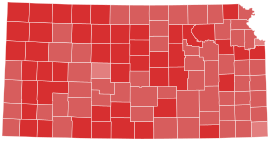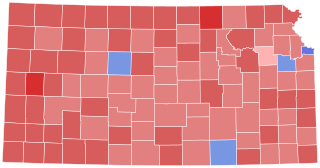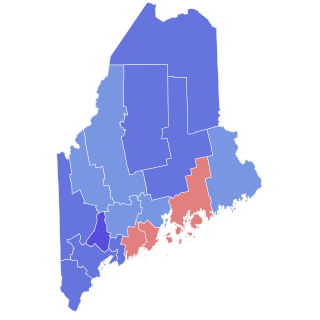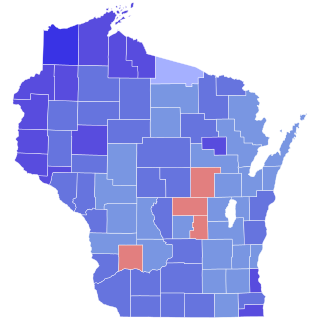| |||||||||||||||||
| |||||||||||||||||
 County results Dole: 50–60% 60–70% 70–80% | |||||||||||||||||
| |||||||||||||||||
| Elections in Kansas |
|---|
 |
The 1986 United States Senate election in Kansas was held on November 4, 1986. Incumbent Republican Bob Dole defeated Democratic nominee Guy MacDonald with 70.05% of the vote.
| |||||||||||||||||
| |||||||||||||||||
 County results Dole: 50–60% 60–70% 70–80% | |||||||||||||||||
| |||||||||||||||||
| Elections in Kansas |
|---|
 |
The 1986 United States Senate election in Kansas was held on November 4, 1986. Incumbent Republican Bob Dole defeated Democratic nominee Guy MacDonald with 70.05% of the vote.
Primary elections were held on August 5, 1986. [1]
| Party | Candidate | Votes | % | |
|---|---|---|---|---|
| Democratic | Guy MacDonald | 31,942 | 27.66 | |
| Democratic | Darrell Ringer | 30,483 | 26.39 | |
| Democratic | W.H. Addington | 21,082 | 18.25 | |
| Democratic | Lionel Kunst | 18,795 | 16.27 | |
| Democratic | Jim Oyler | 13,201 | 11.43 | |
| Total votes | 115,503 | 100.00 | ||
| Party | Candidate | Votes | % | |
|---|---|---|---|---|
| Republican | Bob Dole (incumbent) | 228,301 | 84.39 | |
| Republican | Shirley J.A. Landis | 42,237 | 15.61 | |
| Total votes | 270,538 | 100.00 | ||
| Party | Candidate | Votes | % | ±% | |
|---|---|---|---|---|---|
| Republican | Bob Dole (incumbent) | 576,902 | 70.05% | ||
| Democratic | Guy MacDonald | 246,664 | 29.95% | ||
| Majority | 330,238 | 40.10% | |||
| Turnout | 823,566 | ||||
| Republican hold | Swing | ||||

The 1996 United States presidential election was the 53rd quadrennial presidential election, held on Tuesday, November 5, 1996. Incumbent Democratic President Bill Clinton and his running mate incumbent Democratic Vice President Al Gore were re-elected to a second and final term defeating the Republican ticket of former Senate Majority Leader Bob Dole and former Secretary of Housing and Urban Development Jack Kemp and the Reform ticket of businessman Ross Perot and economist Pat Choate.
The Democratic Senatorial Campaign Committee (DSCC) is the Democratic Hill committee for the United States Senate. Its purpose is to elect Democrats to the United States Senate. The DSCC's current Chair is Senator Gary Peters of Michigan, who succeeded Nevada's Catherine Cortez Masto after the 2020 Senate elections. DSCC's current executive director is Christie Roberts.

The 1996 United States Senate elections were held on November 5, 1996, with the 33 seats of Class 2 contested in regular elections. Special elections were also held to fill vacancies. They coincided with the presidential election of the same year, in which Democrat Bill Clinton was re-elected president.

The 1986 United States Senate elections were elections for the United States Senate. Held on November 4, in the middle of Ronald Reagan's second presidential term, the 34 seats of Class 3 were contested in regular elections. The Republicans had to defend an unusually large number of freshman Senate incumbents who had been elected on President Ronald Reagan's coattails in 1980. Democrats won a net of eight seats, defeating seven freshman incumbents, picking up two Republican-held open seats, and regaining control of the Senate for the first time since January 1981. This remains the most recent midterm election cycle in which the sitting president's party suffered net losses while still flipping a Senate seat.

The 1978 United States Senate elections were held on November 7, in the middle of Democratic President Jimmy Carter's term. The 33 seats of Class 2 were contested in regular elections. Special elections were also held to fill vacancies.

The 1974 United States Senate elections were held on November 5, with the 34 seats of Class 3 contested in regular elections. They occurred in the wake of the Watergate scandal, Richard M. Nixon's resignation from the presidency, and Gerald Ford's subsequent pardon of Nixon. Economic issues, specifically inflation and stagnation, were also a factor that contributed to Republican losses. As an immediate result of the November 1974 elections, Democrats made a net gain of three seats from the Republicans, as they defeated Republican incumbents in Colorado and Kentucky and picked up open seats in Florida and Vermont, while Republicans won the open seat in Nevada. Following the elections, at the beginning of the 94th U.S. Congress, the Democratic caucus controlled 60 seats, and the Republican caucus controlled 38 seats.
The Pennsylvania Republican Party (PAGOP) is the state affiliate of the Republican Party in Pennsylvania. It is headquartered in Harrisburg. Its chair is Lawrence Tabas and is the second largest political party in the state behind the Pennsylvania Democratic Party.

The 2000 United States elections were held on November 7, 2000. Republican governor George W. Bush of Texas defeated Democratic Vice President Al Gore of Tennessee in the presidential election. Republicans retained control of both houses of Congress, giving the party unified control of Congress and the presidency for the first time since the 1954 elections.

The 1996 United States elections were held on November 5 1996. Democratic President Bill Clinton won re-election, while the Republicans maintained their majorities in both houses of the United States Congress.

The 1996 United States presidential election in Georgia took place on November 5, 1996, as part of the 1996 United States presidential election. Voters chose 13 representatives, or electors to the Electoral College, who voted for president and vice president.

The 1996 United States Senate special election in Kansas was held November 5, 1996, concurrently with the presidential election and the regularly scheduled election for the state's Class 2 seat. Incumbent Republican U.S. Senator and Senate Majority Leader Bob Dole, the Republican nominee for president, had resigned on June 11, 1996, in order to focus on his presidential campaign. Lieutenant Governor Sheila Frahm was appointed to the seat upon Dole's resignation, but she was defeated in the primary by Representative Sam Brownback, who went on to win the general election over Democrat Jill Docking.

The 1988 United States elections were held on November 8 and elected the president of the United States and members of the 101st United States Congress. Republican Vice President George H. W. Bush defeated Democratic Governor of Massachusetts Michael Dukakis. Despite Dukakis' defeat, the Democratic Party built on their majorities in Congress.

The 1968 United States Senate election in Kansas took place on November 5, 1968, concurrently with the U.S. presidential election as well as other elections to the United States Senate in other states as well as elections to the United States House of Representatives and various state and local elections.

The 1970 United States Senate election in Maine was held on November 3, 1970. Incumbent Democrat Edmund Muskie defeated Republican nominee Neil S. Bishop with 61.74% of the vote.

The 1982 United States Senate election in Wisconsin was held on November 2, 1982. Incumbent Democrat William Proxmire defeated Republican nominee Scott McCallum in a landslide, taking 63.65% of the vote to McCallum's 34.14%.

The 1976 United States Senate election in Wisconsin was held on November 2, 1976. Incumbent Democrat William Proxmire defeated Republican nominee Stanley York in a landslide, taking 72.20% of the vote.

The 1974 United States Senate election in California was held on November 5, 1974. Incumbent Democrat Alan Cranston defeated Republican nominee H. L. Richardson with 60.52% of the vote.

The 1974 United States Senate election in Kansas took place on November 5, 1974. Incumbent Republican U.S. Senator Bob Dole was narrowly re-elected to a second term in office.

The 1974 United States Senate election in Missouri was held on November 5, 1974. Incumbent Democrat Thomas Eagleton defeated Republican nominee Thomas B. Curtis, a former U.S. Representative, with 60.07% of the vote. This was a rematch of the 1968 election, when Eagleton defeated Curtis by a narrow margin.

The 1980 United States Senate election in Missouri was held on November 4, 1980. Incumbent Senator Thomas Eagleton defeated Republican nominee Gene McNary with 52.00% of the vote. As of 2024, this is the last time the Democrats won the Class 3 Senate seat in Missouri.